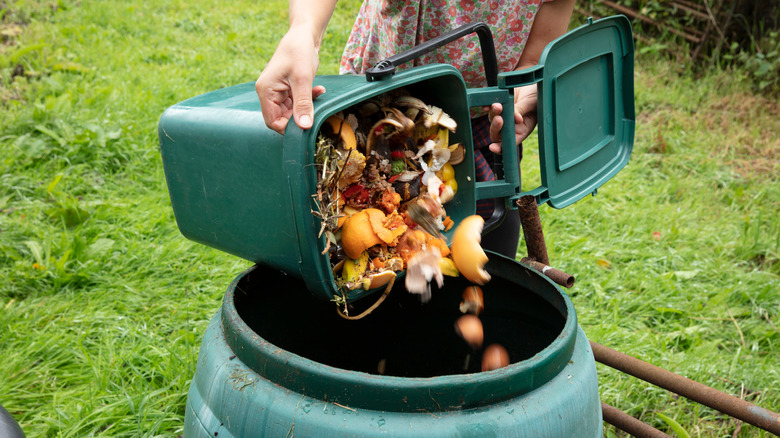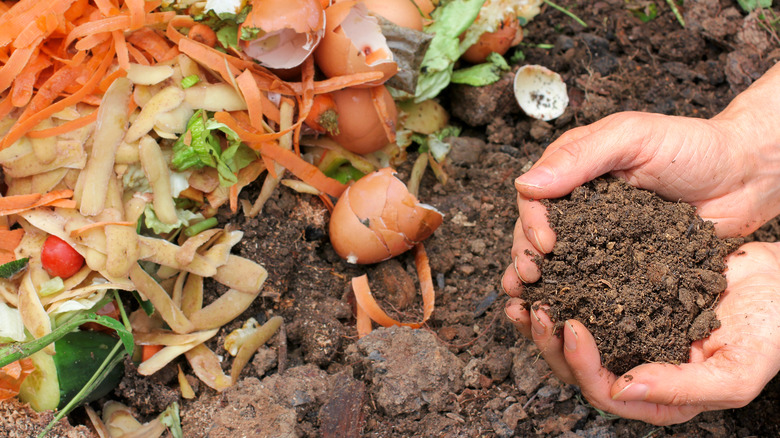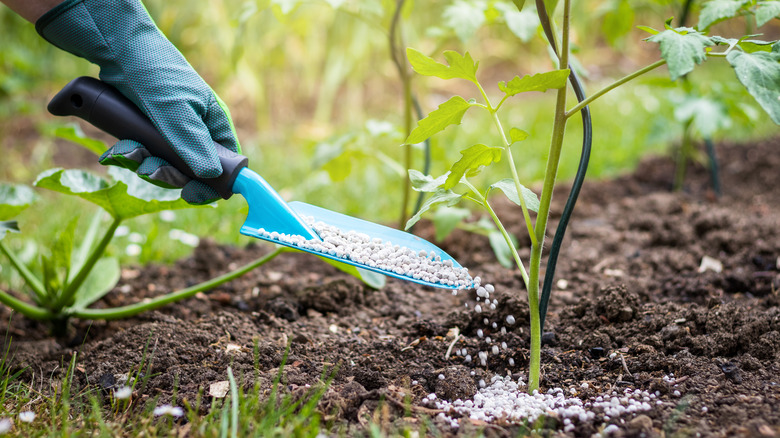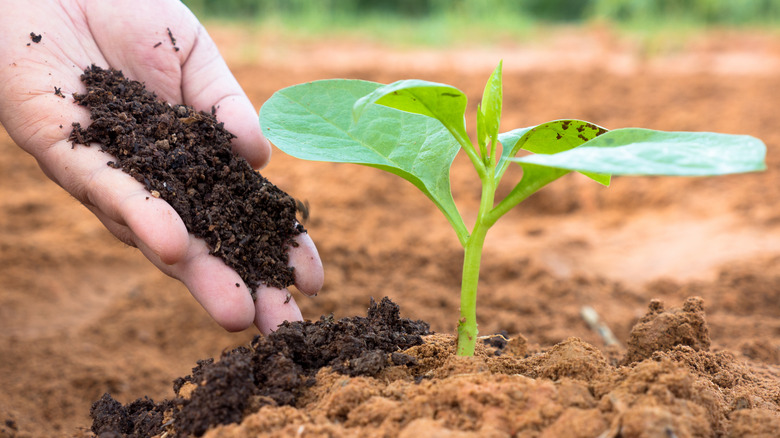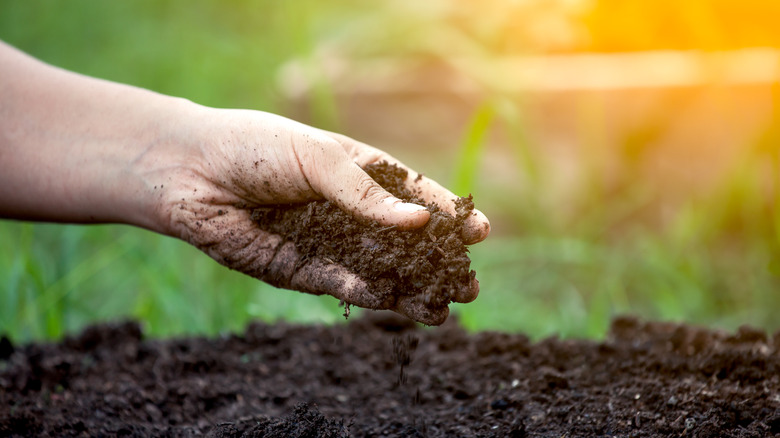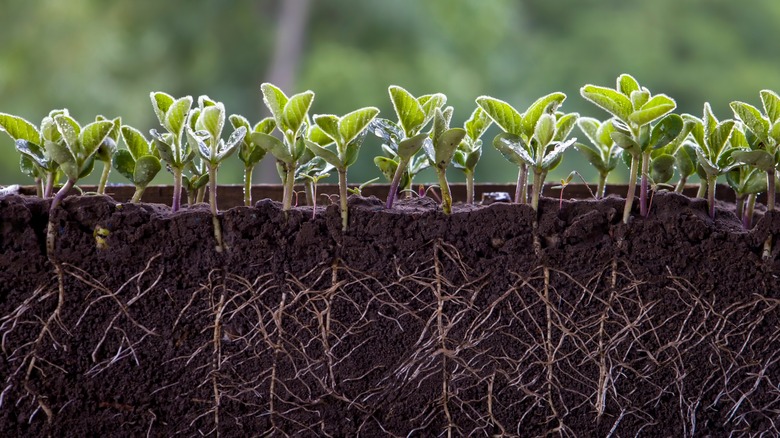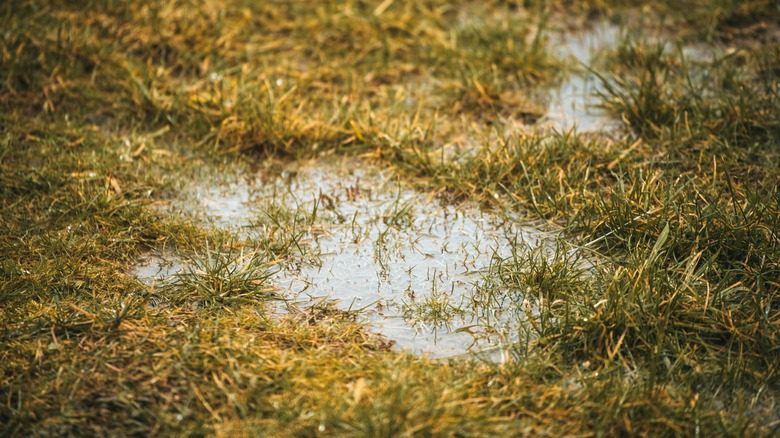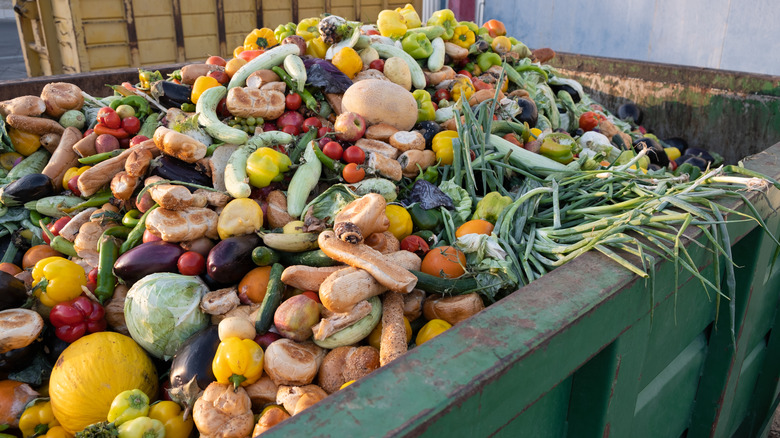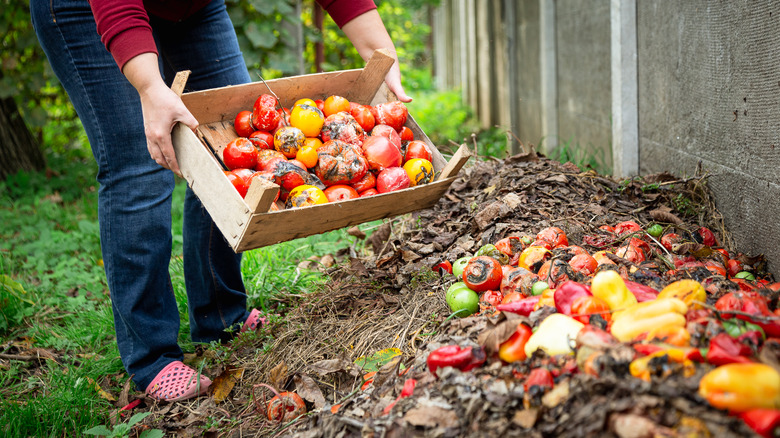The Biggest Benefits Of Composting At Home
If you're a gardener, starting a home composting system is a no-brainer. It's a natural way to enhance your soil and boost the health of your plants. It's also an environmentally friendly way of gardening that helps reduce climate change and reliance on chemical fertilizers. Home composting is a great way of cutting down on the amount of food waste sent to landfills and can help save you money in the long term. Keeping a compost bin in your backyard will not only boost your soil's organic content but it helps sustain a community of insects that are a valuable food source for animals.
Getting started with home composting is a walk in the park. All you need is a little air, water, shelter, and some garden and food waste. Fortunately, the first two ingredients are free and nearly every household creates an excess of the third. Once you have a bin, either purpose-built or makeshift to put it all in, you're good to go. The true beauty of home composting is that the process pretty much takes care of itself. Just add the vegetable and fruit peels, tea bags, eggshells, and grass cuttings, and over time that unsightly mess will turn into what's often referred to as black gold. Once this strange alchemy has taken place it's time to spread this nutritional and life-enriching wonder stuff on your garden, sit back, and fully appreciate the biggest benefits of composting at home.
Compost is beneficial for the environment
What's good for the environment is good for us and it doesn't get much more environmentally friendly than compost. With a bit of time and patience, anyone can turn what would once have been consigned to the trash can into a soil super-enhancer. The science behind composting is simple. When food and plant scraps are left to rot, tiny microorganisms get to work turning all that decaying matter into black gold for your garden. North Carolina State composting expert Rhonda Sherman told The National Geographic, "When you have a compost pile, you become a microbe farmer. And what do microbes need? They need the same things we do. Which is air, water, food, shelter."
Compared to the microbes in landfills that can survive in airless conditions and produce methane, the aerobic microbes found in compost produce carbon dioxide. It's still a greenhouse gas but less damaging to the environment and produced in far fewer quantities than is created by the landfill process. In 2018 landfills accounted for 34 percent of all methane emissions in the U.S. After introducing mandatory composting laws in 2009, San Francisco has reduced its landfill waste by 80 percent and it's estimated they've slashed their carbon dioxide emissions by 90,000 metric tons. To put that in perspective it's equal to the carbon dioxide emission of 20,000 cars. As a bonus, the microbes in a compost pile can generate heat over 130 degrees Fahrenheit, which can kill pathogens.
It's a natural substitute for chemical fertilizers
Although chemicals may have their place it's preferable to keep them out of your garden and off your plants if you can. The good news is compost is an effective and natural substitute for chemical fertilizers. For plants to thrive they need soil that is rich in the nutritional goodness of potassium, phosphorus, and nitrogen. Chemical fertilizers are loaded with these bad boys but the downside is that they can literally cost the earth. They can also overwhelm your plants with their harsh and unnatural properties and be detrimental to the soil's beneficial microbes. On the other hand, the organic mix that goes under the banner of compost is completely chemical-free and a far cheaper substitute.
As it is made of rotting natural products, compost replenishes the nutrients in the soil in the same way that nature has done for millions of years. Chemical fertilizers are specifically designed to target the plant's needs but can be easily washed away by heavy rainfall or depleted by a high water table. This can lead to the chemicals causing havoc in freshwater areas and even drinking water supplies. It may not have the lightning-fast effects of chemical fertilizers, but compost releases its nutrients slowly in a manner that is far more reminiscent of the natural cycle. A study by WRAP concluded, "Repeated (annual) applications of compost are a valuable means by which farmers can improve soil quality, potentially leading to increases in crop yields through improved nutrient and water acquisition."
It keeps your plants healthy
A wilting or drooping plant is a sight to make any gardener hang their head in shame. Unhealthy plants are often the result of unhealthy soil. You can ensure this doesn't happen to you by home composting and keeping an ever-ready supply of black gold within arm's reach. Compost keeps your plants healthy by improving the structure and fabric of your soil. By strengthening the air pockets and allowing air, water, and roots better access, your plants will thrive. Compost can help loose soil that is too dense and if the soil is too loose it can help it clump together. And, because it balances the nutrients in the soil, compost denies weeds the unbalanced ecosystem they need to flourish.
The varying nutrients that compost provides such as nitrogen, phosphorous, potassium, manganese, copper, iron, and zinc also act as a perfect diet for your plants to stay in tip-top condition. A good quality mix also attracts insects and other microorganisms which will improve your soil's biodiversity and provide optimal growing conditions for your plants. The insects that thrive in a compost-rich garden such as ladybugs, praying mantis, and ground beetles can also keep destructive insects such as cabbage maggots and aphids from eating your plants. Plus, it provides plants with an ever-ready supply of nutrients that also have a better chance of fighting diseases.
It can help boost your soil's moisture levels
Compost can retain and transfer water through your soil like a sponge, and it is perfect for boosting your soil's moisture levels. Through its increased infiltration and absorption properties, compost will retain water and help it soak into the soil instead of flowing off of your garden and into a nearby drain. By adding compost you improve your soil's moisture retention levels which in turn provide optimal growing conditions and reduce the need for irrigation or frequent watering.
Data published by the University of Michigan revealed that when three inches of compost was added to six inches of sandy soil, its water retention properties increased by a staggering 250 percent. Researchers found that 8 inches of soil amended with compost held nearly a half-inch more water than unamended soil. In practical terms, this entails that plants would stay hydrated for two weeks longer.
It enhances the overall health of your soil
Healthy soil is happy soil and adding a little compost to your garden will ensure yours is getting the daily dose of nutrients it needs. We've already established that compost improves the structure of your soil and boosts its moisture levels. However, that's just the tip of the black gold iceberg. By adding it to the soil you provide a breeding ground for a host of beneficial organisms and microorganisms that all pull together to keep your soil as healthy and fertile as possible. Soil loaded with beneficial microbes increases your plant's accessibility to nutrients and increases the level of humus formation.
Humus is the miracle glue that prevents soil erosion by binding it together in particles and gives healthy soil its dark brown, moist, and healthy appearance. Without it, your soil would be as dry, washed out, and barren as a desert. Compost works a treat at binding together chemical contaminants and heavy metals in the soil. It helps prevent them from leaking into plants where they could pose a danger to humans and animals. Compost-rich soil is also effective at storing the carbon plants have absorbed from the air, making it the climate-friendly choice for gardeners everywhere.
It helps fight water contamination
According to the U.S. Composting Council, research has shown that the growing problem of water pollution in our rivers, lakes, and estuaries can be combated in part by composting. Adding a layer to the soil helps prevent erosion and stops pesticides, herbicides, and other pollutants from escaping and contaminating groundwater or runoff. Once they have escaped, the soil it is almost impossible to stop them from contaminating larger bodies of water.
As well as increased water contamination, large levels of runoff can lead to extreme flooding, and the loss of habitat for many species. The part plants and soil have in managing the environment is widely recognized and compost plays an integral role in that process. Home composting improves the overall health of your garden and reduces the use of harmful chemicals. By starting that little compost pile in your garden you are helping keep the animals that live in and drink from nearby water healthier.
Compost helps reduce food waste
It's estimated that a quarter of the food that the average household buys ends up in the trashcan. That's a lot of avoidable waste being sent to landfill. When you factor in the energy and resources used to produce that food it also leaves a considerable carbon footprint. Not to mention the hit to your finances. Research shows that a family of four will discard anywhere between $1,350 to $2,275 in food. That's a lot of raw and quality compost material going to waste.
By home composting not only are you putting all that waste to good use and helping feed the soil and plants, you're helping the climate. When organic waste finds its way to landfills it creates a lot more methane than when used for composting. It also requires the burning of a lot of fossil fuels to take it from point A to B. Using that leftover food in your garden is satisfying because you are contributing to the natural cycle of things rather than simply throwing your money away.
It is sustainable
Home composting is no flash-in-the-pan gimmick or passing trend. It's been used for centuries because it works and is sustainable. It's the gift that keeps on giving because it's extremely beneficial to your garden, and it's one of the most sustainable and greenest things you can do. It helps combat climate change by reducing landfill and incineration emissions and does not require the use of machinery or heating processes that much store-purchased compost does.
Home composting requires very little effort on your behalf and is the architect of its own alchemy. It needs very little resources other than that which you'd usually throw away. You can use it to recycle a diverse range of organic materials from food and vegetable scraps, paper, tea bags, coffee grounds, grass clippings, cardboard, and fruit. Composting is sustainable because it teaches us the valuable lesson that there is no real waste product in nature. Everything plays a part in the bigger picture and can be recycled for the benefit of other living things.
